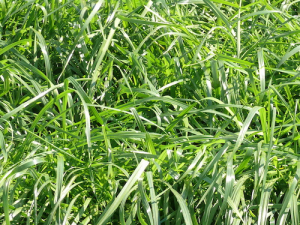Annual ryegrass in a pasture renewal cycle gives farmers an opportunity to clean up dirty paddocks, says Dow Agro Sciences.
In such paddocks deep rooted perennial weeds have become seemingly impossible to control, the company says.
“A proven strategy is to build a cropping programme around pasture renewal.
“The decision to renew a pasture is triggered when pasture production drops significantly, usually as a result of heavy infestations of deep rooted perennial weeds that resist ‘clover friendly’ herbicides.
“The economic benefit of spraying out underperforming pastures and replacing them with new high performing varieties is usually far greater than the decision to persist with old underperforming pasture.”
The cropping phase of pasture renewal gives a rare opportunity to achieve long term control of hard-to-kill weeds such as Californian thistle, dock and, in more recent years, oxeye daisy, that are often not well controlled by ‘clover safe’ pasture herbicides, Dow says.
While glyphosate is effective against grasses, broadleaf weeds are not so well controlled by glyphosate alone. Various broadleaf herbicides and adjuvants are often added to glyphosate to improve broadleaf weed control, but deep rooted perennial broadleaf weeds such as dock, Californian thistle and oxeye daisy often regrow because their root systems are not totally killed.
So while it may look as though a good kill has been achieved two three weeks after a spray application, a short time later these weeds re-emerge having regrown from live root remnants. If these deep rooted perennial broadleaf weeds are not well controlled in the cropping phase of the pasture renewal cycle they quickly become an issue and little is gained.
A reliable solution to this problem is seen in its product T-Max, says Dow. Its active ingredient (aminopyralid) readily moves through the sap stream and completely kills the root system, killing deep rooted perennial broadleaf weeds.
A new registration for T-Max allows tank mixing with glyphosate at spray-out, prior to sowing annual ryegrass. While ryegrass can be sown straight after T-Max in a spray-out application, it is recommended to wait at least six months before reestablishing clover.
Tank mixing T-Max with glyphosate prior to sowing annual grass in autumn provides a buffer to ensure good clover establishment the following season.
T-Max facts
- Fast knockdown of broadleaf weeds
- Strong control of the widest range of hard-to-kill perennial weeds
A spray-to-plant interval of three days for perennial weeds or one day for annual weeds.
Stock can graze anytime after spraying.


















